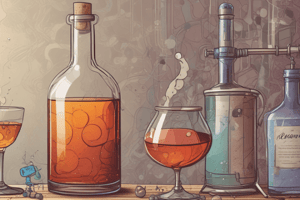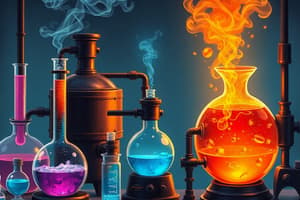Podcast
Questions and Answers
What is the effect of temperature on the rate of evaporation?
What is the effect of temperature on the rate of evaporation?
- The rate of evaporation is independent of the temperature.
- The rate of evaporation is directly proportional to the temperature. (correct)
- The rate of evaporation decreases as the temperature increases.
- The rate of evaporation is inversely proportional to the temperature.
What is the primary difference between evaporation and boiling?
What is the primary difference between evaporation and boiling?
- Evaporation is a faster process, while boiling is slower.
- Evaporation is only possible at high temperatures, while boiling can occur at low temperatures.
- Evaporation occurs at the boiling point of a liquid, while boiling occurs below it.
- Evaporation occurs on the surface of a liquid, while boiling occurs throughout the liquid. (correct)
What type of distillation involves the use of steam?
What type of distillation involves the use of steam?
- Vacuum distillation
- Fractional distillation
- Simple distillation
- Steam distillation (correct)
What is the purpose of the condenser in a distillation apparatus?
What is the purpose of the condenser in a distillation apparatus?
What is the difference between simple and fractional distillation?
What is the difference between simple and fractional distillation?
Why is it necessary to evaporate extremely heat sensitive substances under reduced pressure?
Why is it necessary to evaporate extremely heat sensitive substances under reduced pressure?
What is the effect of increasing the surface area of the content vessel on the rate of evaporation?
What is the effect of increasing the surface area of the content vessel on the rate of evaporation?
What is the effect of atmospheric aqueous vapour pressure on the rate of evaporation?
What is the effect of atmospheric aqueous vapour pressure on the rate of evaporation?
Why is agitation necessary during evaporation?
Why is agitation necessary during evaporation?
What is the effect of atmospheric pressure on the liquid under evaporation?
What is the effect of atmospheric pressure on the liquid under evaporation?
Flashcards are hidden until you start studying
Study Notes
Distillation
- Definition: Distillation is the process of vaporizing a liquid, re-condensing it, and collecting it in a container.
- Boiling point of mixtures depends on mole fraction of the component present.
- In pure substances, temperature remains constant during distillation as long as both vapor and liquid are present.
- In miscible liquid mixtures, temperature increases throughout the process because the composition of vapor changes continuously.
Types of Distillation
- Simple distillation
- Fractional distillation
- Steam distillation
- Vacuum distillation
- Destructive distillation
Distillation Apparatus
- Heat source
- Still pot
- Still head
- Thermometer/Boiling point temperature
- Condenser
- Cooling water in and out
- Distillate/receiving flask
- Vacuum/gas inlet
- Still receiver
- Heat control
- Stirrer speed control
- Stirrer/heat plate
- Heating (Oil/sand) bath
- Stirrer bar/anti-bumping granules
- Cooling bath
Evaporation
Introduction
- Evaporation is a type of vaporization that occurs only on the surface of a liquid.
- Theoretically, evaporation means the free escape of vapors from the surface of a liquid below its boiling point.
Factors Affecting Evaporation
- Temperature: rate of evaporation is directly proportional to temperature.
- Surface area: rate of evaporation is directly proportional to the surface area of the content vessel exposed.
- Agitation: stirring or agitating the solution prevents decomposition of the preparation at the bottom of the container.
- Atmospheric aqueous vapour pressure: rate of evaporation is affected by atmospheric moisture content.
- Atmospheric pressure on the liquid under evaporation: rate of evaporation is inversely proportional to atmospheric pressure on the surface of the liquid.
Importance of Temperature in Evaporation
- Maximum evaporation is attained at the boiling point of the liquid.
- Thermostable preparations can be evaporated at higher temperatures, while thermolabile preparations require low temperatures.
- Extremely heat-sensitive substances are evaporated under reduced pressure.
- Time required for evaporation is critical, and evaporation should be carried out for a short time at low temperature.
Studying That Suits You
Use AI to generate personalized quizzes and flashcards to suit your learning preferences.




